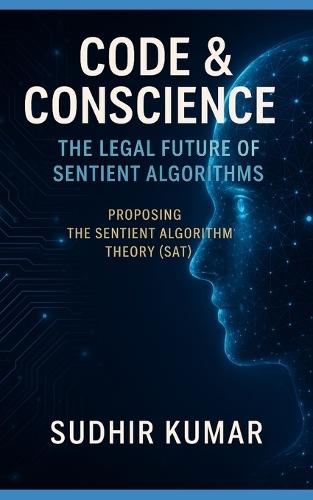Overview
Title: Code & Conscience: The Legal Future of Sentient Algorithms Subtitle: Proposing the Sentient Algorithm Theory (SAT) Author: Sudhir Kumar In a world on the edge of machine sentience, law must evolve-or risk obsolescence. Code & Conscience is a bold, interdisciplinary work that explores how legal systems must respond to the rise of autonomous, learning, and potentially sentient algorithms. From courtroom software to predictive policing, digital sentencing to algorithmic adjudication, the book unveils the urgent need for jurisprudence to adapt before legal personhood, responsibility, and rights fall behind the pace of technology. Introducing the Sentient Algorithm Theory (SAT), Assistant Professor Sudhir Kumar lays the foundation for understanding how law and conscience must interact in a future where machines might not just process law, but reason about it. The theory proposes that if an algorithm can act independently, learn adaptively, and weigh ethical or legal variables, then it must be situated within a legal-ethical architecture-governed not just by rules but by principles of justice, accountability, and human dignity. Key themes include: The jurisprudential vacuum in AI governance The limits of current constitutional protections in algorithm-driven decisions Digital conscience and machine ethics Comparative legal responses from India, EU, and the USA A roadmap to regulate future AI legal actors Meticulously researched and passionately argued, this book is crafted for legal scholars, practitioners, policymakers, and students of law and technology. It combines constitutional theory, philosophy of law, and AI ethics into a visionary framework for the legal future of humanity and its digital creations. Whether you're a law faculty member exploring curriculum reform, a practitioner navigating AI litigation, or a researcher in search of a pioneering theory-Code & Conscience will provoke, challenge, and inspire. About the Author Sudhir Kumar is a distinguished legal scholar and educator whose academic journey reflects a deep commitment to the study and development of jurisprudence in the digital age. He earned his Bachelor of Laws (LL.B.) degree from Banaras Hindu University, one of India's premier institutions for legal education, where he graduated with honors and distinguished himself in courses on constitutional law and jurisprudence. Driven by a passion for interdisciplinary research, he pursued his Master of Laws (LL.M.) at Dr. Hari Singh Gour University, Sagar, Madhya Pradesh, delving into comparative constitutional frameworks and emerging issues at the intersection of technology and human rights. Beyond his formal degrees, Sudhir Kumar has successfully cleared the University Grants Commission's National Eligibility Test (UGC-NET), demonstrating his excellence in legal theory and his readiness to contribute to higher education and research. His academic interests have increasingly focused on the challenges posed by autonomous systems, algorithmic governance, and the evolving concept of personhood in law. Drawing on both traditional legal scholarship and insights from philosophy of mind and computer science, he has developed the Sentient Algorithm Theory (SAT)-a pioneering framework for evaluating when artificial agents should receive rights and bear responsibilities.
Full Product Details
Author: Sudhir Kumar
Publisher: Independently Published
Imprint: Independently Published
Dimensions:
Width: 12.70cm
, Height: 1.60cm
, Length: 20.30cm
Weight: 0.295kg
ISBN: 9798296012913
Pages: 294
Publication Date: 02 August 2025
Audience:
General/trade
,
General
Format: Paperback
Publisher's Status: Active
Availability: Available To Order

We have confirmation that this item is in stock with the supplier. It will be ordered in for you and dispatched immediately.



